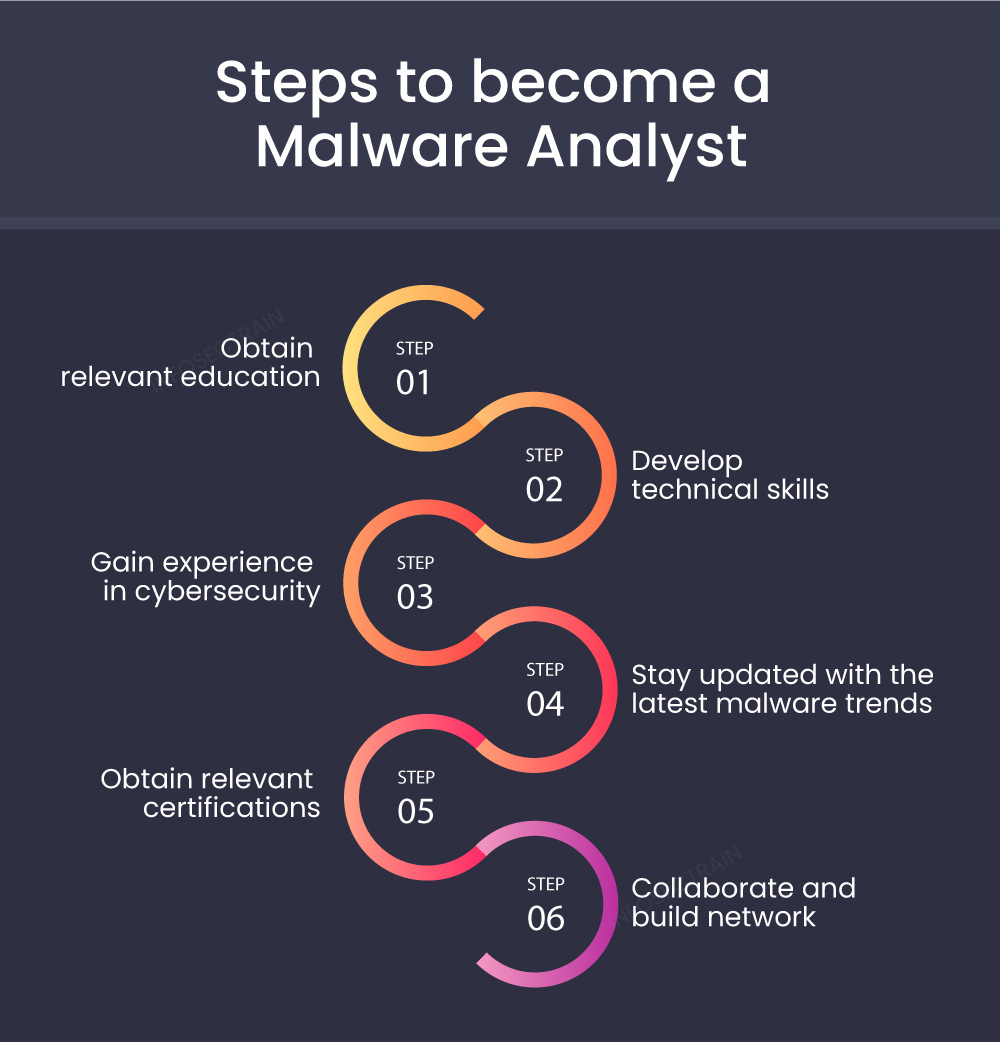How to become a Malware Analyst?
Malware Analysts play a critical and rapidly growing role in the cybersecurity industry. With the ever-evolving landscape of cyber threats and the rise of sophisticated malware attacks, organizations seek skilled professionals who can analyze and prevent these threats. As a result, the demand for Malware Analysts is rapidly growing, making it a promising career path for cybersecurity professionals. They play an important role in identifying and mitigating malware threats. As cyber threats keep evolving, the need for skilled Malware Analysts is expected to grow even further in the cybersecurity industry.

This article will guide you to become a Malware Analyst, but first, you need to understand what that role entails. Let’s get started.
Table of Contents
What is a Malware Analyst?
Roles and responsibilities of a Malware Analyst
How to become a Malware Analyst?
Malware Analyst’s salary
What is a Malware Analyst?
A Malware Analyst is a cybersecurity professional specializing in identifying, analyzing, investigating, and mitigating malware threats and software, such as viruses, worms, ransomware, adware, bots, Trojan horses, bugs, rootkits, and spyware. They play a vital role in detecting and mitigating malware threats, which can have significant consequences for organizations if left undetected or unaddressed. They work closely with other cybersecurity professionals, such as Incident Responders, Threat Intelligence Analysts, and Security Engineers, to prevent and respond to malware attacks and safeguard digital assets.
Roles and responsibilities of a Malware Analyst
A Malware Analyst may have the following roles and responsibilities:
- Identify and analyze malware threats using various tools and techniques.
- Reverse-engineer malware code to understand its behavior and functionality.
- Analyze and monitor network traffic to detect and prevent malware infections.
- Create and maintain malware signatures and Indicators of Compromise (IOCs).
- Collaborate with other cybersecurity professionals to coordinate and implement effective defenses against malware attacks.
- Stay up-to-date with the latest malware trends, techniques, and tools.
- Prepare and deliver reports on malware analysis findings to management and other stakeholders.
- Participate in incident response activities and investigations.
- Research new malware analysis methods and tools and contribute to their development.
How to become a Malware Analyst?
You can achieve a lucrative career by following these steps to become a Malware Analyst.

- Obtain relevant education: To become a Malware Analyst, obtain a relevant education in cybersecurity, computer science, or information technology. A bachelor’s or master’s degree in these fields can provide a solid foundation in computer systems, networks, and cybersecurity concepts essential for a malware analysis career.
- Develop technical skills: Familiarize yourself with various tools and techniques used in malware analysis, such as static and dynamic analysis, reverse engineering, sandboxing, and network traffic analysis. Develop proficiency in operating systems, networking protocols, and programming languages like Python, C/C++, and Assembly, commonly used in malware analysis.
- Gain experience in cybersecurity: Building a strong background in cybersecurity through relevant work experience, internships, or participation in cybersecurity projects can help you develop the expertise necessary for a career in malware analysis. Participate in bug bounty programs, attend workshops and training sessions, and create your own malware lab to practice and hone your skills.
- Stay updated with the latest malware trends: Keeping up-to-date with the ever-evolving landscape of malware threats, emerging technologies, attack techniques, and industry trends is crucial. Follow reputable sources, participate in online forums or communities, and continuously learn through training and workshops.
- Obtain relevant certifications: There are various certifications available that can help demonstrate proficiency in malware analysis and related areas of cybersecurity. The credentials can help demonstrate expertise and enhance employability for aspiring Malware Analysts.
Here are some certifications that can be helpful for becoming a Malware Analyst:- Certified Threat Intelligence Analyst (CTIA)
- Certified Ethical Hacker (CEH)
- CompTIA Cybersecurity Analyst (CySA+)
- Certified Information Systems Security Professional (CISSP)
- Certified Malware Analyst (CMA)
- Certified Reverse Engineering Analyst (CREA)
- GIAC Reverse Engineering Malware (GREM)
However, CEH, CISSP, and CySA+ certifications may not be directly relevant to becoming a Malware Analyst position, but they are incredibly important. These certifications cover a range of cybersecurity concepts and skills, including malware analysis, threat detection and response, network security, incident response, security operations, security assessment, and more, which can be helpful for a career as a Malware Analyst.
- Collaborate and build a network: Networking with other cybersecurity professionals, participating in cybersecurity communities, attending industry events, and collaborating with peers can provide valuable insights and opportunities for professional growth.
Malware Analyst’s salary
The salary of a Malware Analyst can vary depending on several factors, including location, level of experience, and industry. According to data from Glassdoor, the estimated total pay for a Malware Analyst in the United States is around $87,062 per year, with an average salary of $79,826 annually.
How can InfosecTrain help?
InfosecTrain is the industry leader in the provision of information security training and consulting services, with years of expertise. We offer an instructor-led training program for Certified Threat Intelligence Analyst (CTIA), CEH, and CISSP certifications that helps you to enhance and validate your skills. The CTIA certification covers a range of topics related to cyber threat intelligence, including malware analysis, reverse engineering, and digital forensics. Also, having a CISSP or CEH certification can showcase a strong foundation in cybersecurity and a commitment to continuous learning and professional growth, which can be beneficial for a career in malware analysis. These certifications can help individuals better understand the broader context of malware analysis and its place in the wider field of cybersecurity.







 1800-843-7890 (India)
1800-843-7890 (India)